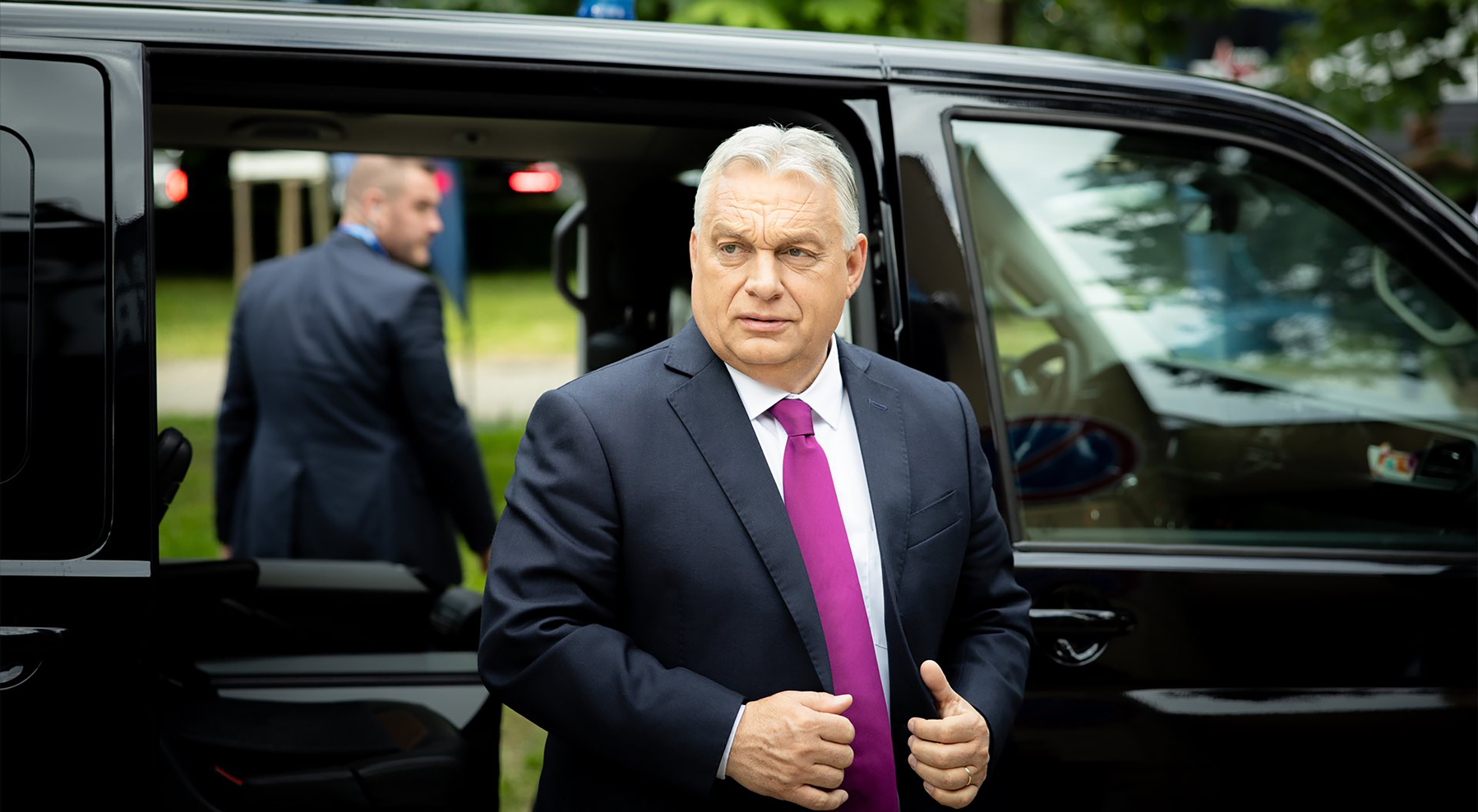Hungary is actively expanding its influence in the Western Balkans by employing a complex approach that combines economic, political, geopolitical, and security instruments. This process is part of the government’s strategic calculations under Prime Minister Viktor Orbán, who is playing a complex, multipurpose domestic, foreign, and geopolitical game.
Diplomacy
Diplomatic contacts between Hungary and the Western Balkan countries have intensified significantly in recent months. From June 1 to July 1, 2025, Hungarian senior officials—including Prime Minister Viktor Orbán, Foreign Minister Péter Szijjártó, and Minister of National Economy Márton Nagy — held multiple meetings with the leaders of the vast majority of countries in the region.
While relations with Serbia, the Republika Srpska in Bosnia and Herzegovina, and North Macedonia have traditionally been close, Hungary is now actively working to deepen ties with other regional states as well.
Special emphasis is placed on Montenegro, whose government recently signed cooperation agreements with Hungary in infrastructure development, telecommunications, information technology, and law enforcement. In this way, Montenegro has emerged as a new priority for Orbán.
Security Partnership
Hungary has long been involved in addressing security issues in the Western Balkans. Hungarian troops actively take part in the EUFOR and KFOR peacekeeping missions. Moreover, Hungarians often occupy leading positions in these missions, underscoring Budapest’s interest in shaping regional security.
Beyond international missions, Hungary’s primary regional security partner is Serbia. In 2023, Belgrade and Budapest signed a strategic defense cooperation agreement. In June 2025, they finalized a bilateral military cooperation plan for 2025, outlining nearly eighty joint activities—ranging from military exercises and peacekeeping deployments to defense industry collaboration.
Serbian President Aleksandar Vučić described the agreement as a step toward a military alliance between the two countries, reflecting both deepening political‑security ties and Budapest’s broader ambitions in the Balkans and Southeast Europe.
Energy
In its economic cooperation with the Western Balkans, Hungary focuses on several key sectors, and among those, energy has a vital role. In the wake of Russia’s war against Ukraine and the resulting shifts in energy supply routes to Europe, Hungary perceives the Balkans as a strategic corridor for energy imports. Serbia is a key ally in this regard: Hungary now receives Russian gas via Serbia through the “Turkish Stream” pipeline.
Another joint Hungarian-Serbian project is the construction of a new oil pipeline, scheduled to begin in 2026. In theory, this route could serve as an alternative for Hungary, which is currently almost entirely dependent on Russian oil. The project involves the former Yugoslav JANAF pipeline, through which oil from Croatian ports on the Adriatic could be transported not only to Serbia but further beyond.
However, at this stage, the only option being discussed by Hungarian and Serbian officials is effectively an extension of the Druzhba pipeline into Serbian territory. This pipeline currently delivers Russian oil to Hungary via Ukraine.
Although the possibility of shutting down this route is under consideration, no decision has been made yet, and Budapest is clearly expected to actively lobby for the continuation of these supplies.
Hungarian officials justify their focus on Russian energy by purely economic considerations. However, this policy de facto maintains and even expands Russia’s influence in Southeast and Eastern Europe, while simultaneously hampering efforts to impose stricter sanctions on Moscow.
Another potential area for Hungarian-Serbian cooperation—with Russian involvement—is nuclear energy.
Currently (despite EU’s objections), Budapest is advancing the Paks II project — a major expansion of Hungary’s only nuclear power plant, built by Russia’s state corporation Rosatom and being financed predominantly (80%) by a Russian state loan. Any Serbian participation in nuclear development with Hungary would inevitably involve Russia and mainly serve Russian interests.
Telecommunications
4iG Group, headquartered in Budapest and controlled by Hungarian investors, owns leading telecom operators in Hungary and across the Western Balkans—such as ONE Crna Gora in Montenegro, ONE Albania in Albania, and, more recently, One Macedonia Telecommunications.
4iG’s management is considered part of Orbán’s inner circle, and media reports suggest that the company’s rapid growth, including the expansion into the Balkans, benefited from the prime minister’s backing.
The special status of 4iG indicates that, apart from purely business considerations, the Balkan development strategy may serve to increase Hungary’s influence in the region. Considering that the telecommunications sector is strategic not only from an economic but also a security standpoint, and that 4iG Group is involved in military activities, the growth of Hungarian influence holds significant potential.
It should be noted that within 4iG Group there exists 4iG Space and Defense Technologies (4iG SDT) — a separate holding company that consolidates the Group’s space and defense interests. 4iG SDT has already established strategic cooperation with leading global players in the industry, including Rheinmetall, as well as UAE’s EDGE Group, L3 Harris Technologies, and Boeing. In the near future, the company’s market position will significantly strengthen—4iG SDT and the state-owned company N7 Holding have agreed to create Hungary’s first public-private defense-industrial holding company. As a result of the agreement, 75% of the shares of the state defense holding are to be transferred to 4iG.
Infrastructure
Among Hungarian involvement in infrastructure, the Budapest–Belgrade high-speed railway is worth a mention.
The renovation of the rail link between Serbia and Hungary is a major regional development project that promises electoral dividends for Vučić and Orbán. More importantly, though, this railway line is part of China’s Belt and Road Initiative. 85% of reconstruction costs are financed by Chinese loans, with Hungary covering the remaining 15% from its own budget.
Budapest’s involvement signals support for Chinese geopolitical ambitions and draws the Western Balkans into their realization.
Recent agreements with Podgorica regarding railway modernization suggest that the line could extend further to Bar on the Adriatic, connecting the Serbian and Hungarian capitals to Montenegro’s port, but also incorporating it into the Chinese logistics. This would not only benefit Montenegro’s economy but also increase the influence of Budapest and Beijing.
In April 2024, the Hungarian government allocated €140 million for a series of projects in the Republika Srpska of Bosnia and Herzegovina. These funds were directed toward infrastructure, agricultural, and energy initiatives, with the aim not only of promoting economic development in this part of BiH but also of supporting the allied Milorad Dodik.
In July 2024, Hungary’s state Eximbank issued a €500 million loan for the development of transport infrastructure and support for the economy of North Macedonia, where the VMRO-DPMNE party, a long-time ally of Orbán, is in power.
The loan is intended to support the development of transport infrastructure and economic growth.
Opposition parties and media in North Macedonia questioned the origin of the funds, suggesting that Eximbank may have used loan resources obtained from China. Nevertheless, the Chinese factor in this case is not decisive. Providing concessional loans and grants to governments loyal to Viktor Orbán has become a tool of Budapest’s ‘economic diplomacy.’ This strategy allows Hungary to strengthen not only economic ties but also political alliances in the region.
The widely known case of granting asylum to former VMRO-DPMNE leader Nikola Gruevski illustrates this trend. But in the case of Dodik, Budapest appears to be no less determined. In addition to economic backing, the President of Republika Srpska, it seems, can also count on other forms of support. The story about the Hungarian authorities’ intention to provide protection for Dodik and to prevent his arrest in February this year—when a group of Hungarian special forces allegedly visited Republika Srpska with exactly this mission—confirms the seriousness of Budapest’s intentions to protect its ally in the region.
Considering that Milorad Dodik is currently the most pro-Kremlin political leader in the region, the support he receives from Budapest can be seen not only as an independent policy of the Hungarian leadership but also as an extension of Russian interests.
European integration
European integration has become another controversial direction in Hungary’s policy in the Western Balkans.
At first glance, the promotion of EU accession for the Western Balkan countries appears uncontroversial—it is a positive sign that Hungarian officials actively lobby for the European Union’s expansion into the region, especially considering that Western Balkan states have been waiting for progress for decades.
However, recently Viktor Orbán’s team has simultaneously supported Western Balkan European integration while campaigning against Ukraine’s accession to the EU, pitting the two processes against one another.
There are no objective or rational arguments to support the idea that Ukraine’s EU accession somehow creates obstacles on the European path for the Balkan states. Each country in the region has its own unique experience with EU integration and its own set of challenges, and Ukraine does not and cannot influence that process for other candidate countries.
Moreover, Hungary itself has failed to advance key Balkan candidates during its recent EU Council presidency:
- North Macedonia’s accession talks remain stalled over Bulgaria’s veto,
- Serbia opened no new chapters amid Belgrade ‑ Pristina normalization issues and Serbia’s refusal to sanction Russia.
Why, then, does Hungary promote Balkan integration? Two theories prevail.
Firstly – to strengthen its influence: Orbán seeks regional prestige by casting himself as the chief advocate for the Balkans’ European future.
An alternative view – Orban’s team, above all things, attempts to provoke anti-Ukrainian sentiment among candidate-states, cultivating an “anti‑Ukrainian coalition” in the region, using EU enlargement as a pretext.
Consequently, a question arises: is the anti‑Ukrainian drive Orbán’s own initiative, or is he acting on Moscow’s behest?
Conclusions
• Budapest’s Balkans policy fuses economic, political, geopolitical, and security interests. Hungary is extending its influence through favorable loans, enhancing political cooperation, and deepening the security cooperation.
• A distinct imbalance is evident: some countries (Serbia, North Macedonia, and Montenegro), or parts of countries (Republika Srpska in BiH) are Hungary’s strategic partners, while others (Albania, Kosovo, Bosnia and Herzegovina’s central institutions, Federation of BiH) receive less attention and backing.
• Hungarian leaders portray their Balkan strategy as sovereign and pragmatic, aimed at securing economic and political dividends. In reality, Hungary’s actions in the Western Balkans are tightly interwoven with advancing Russian and Chinese interests—even if those were never Budapest’s explicit goals.



